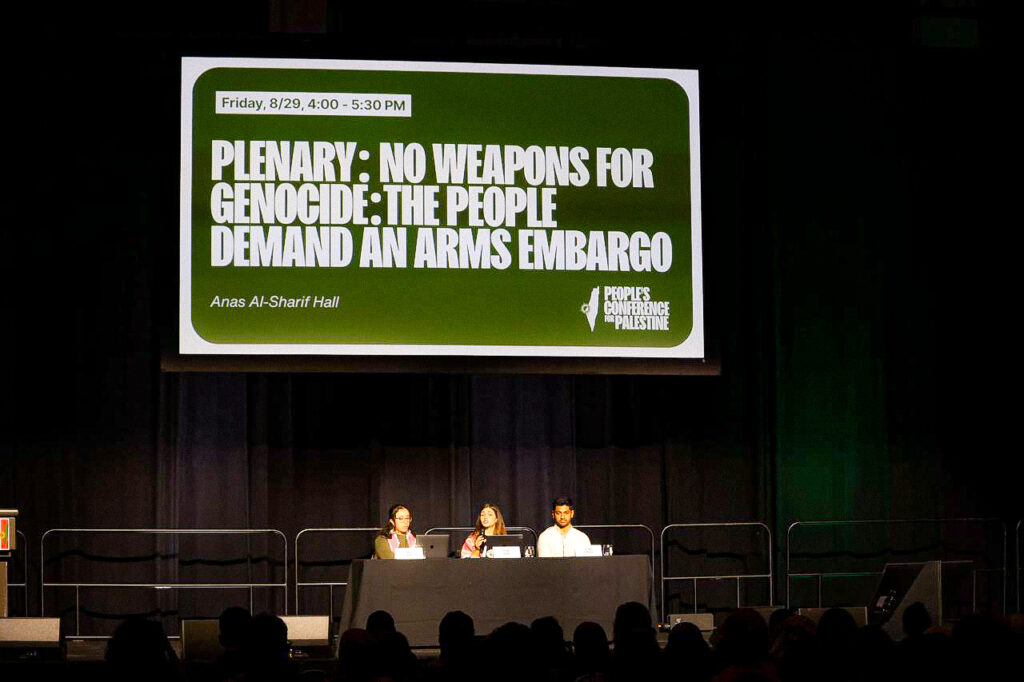Thousands gathered in Detroit from August 29 to 31 for the second annual People’s Conference for Palestine, three days devoted to collective learning, strategy, and commitment to Palestinian liberation. The program featured voices such as labor organizer Chris Smalls, Columbia student activist Mahmoud Kahlil, Imam Omar Suleiman, and Representative Rashida Tlaib – the first Palestinian-American woman elected to Congress – alongside members of the Palestinian Youth Movement (PYM) and other organizations.
Among the many diverse aspects of the global movement for Palestine, the conference highlighted the growing demand for an arms embargo against Israel.
 “The People Demand an Arms Embargo” panel at the People’s Conference for Palestine (Photo via PC4P)
“The People Demand an Arms Embargo” panel at the People’s Conference for Palestine (Photo via PC4P)
“Mask Off Maersk”: a year of building a “people’s arms embargo”
At last year’s People’s Conference for Palestine, organizers with the Palestinian Youth Movement launched “Mask Off Maersk,” a global campaign to expose the shipping giant’s role in transporting weapons components to Israel.
This campaign has since taken off as the demand for an arms embargo against Israel has spread across the globe. “Mask Off Maersk” has redefined the stakes for all corporations that facilitate the transport of weapons to Israel amid its genocide against Gaza.
In June, Maersk became the first major global shipping company to divest from firms operating in Israeli settlements. In April, protesters in Morocco successfully delayed Maersk vessels bound for Israel, and by November 2024, the Spanish government announced it had blocked two Maersk-operated ships carrying military cargo to Israel.
Aisha Nizar, an organizer with the Palestinian Youth Movement, described how to make the larger vision of a “people’s arms embargo” a reality. As Nizar described, what the organizers and researchers behind “Mask Off Maersk learned is that Maersk is actually using civilian infrastructure to transfer weapons.”
“That’s a contradiction in and of itself, because we don’t want our civilian infrastructures to be carrying militarized cargo, let alone do we want our civilian infrastructure to be facilitating genocide,” Nizar explained. “Nobody consented to that. So it’s a contradiction in and of itself, but it’s also an opportunity, because the masses are with Palestine, and the masses do not want to be complicit in this genocide, and if they’re going to use our civilian infrastructure, then what that does is provide an opportunity for everyday people to intervene in the supply chain of death.”
“What we learned was that we actually need to start identifying what these supply chains are, how they function, how our infrastructure is complicit in this, and illuminate a larger system that provides us an avenue to materially stop this genocide from everyday workers,” Nizar said.
“The Hague Group” takes the arms embargo demand to the global level
According to Sachin Peddada, the Research Coordinator of the Progressive International, “Every state should be having a total arms embargo against Israel.” On January 31 of this year, Progressive International convened “The Hague Group,” in which representatives from the governments of Belize, Bolivia, South Africa, Namibia, Colombia, Cuba, Honduras, Malaysia, and Senegal gathered in The Hague in the Netherlands with the aim of holding Israel accountable for crimes against humanity and to implement an arms embargo.
The Group convened an emergency meeting in Bogotá from July 15-16, where member states discussed coordinated measures to enforce international law. Representatives from more than 30 countries, including Brazil, China, Indonesia, Ireland, Mexico, Norway, Pakistan, Portugal, Qatar, Spain, and Turkey, took part in the talks.
Following the meeting, 12 participating states pledged to implement six measures aimed at halting arms transfers, blocking institutional and financial support for the Israeli occupation of Palestinian territories, and advancing legal investigations and prosecutions of international crimes committed in Palestine.
“Regular people of the world are the most able to call out injustice for what it is, because we are not wedded to these systems that oppress us, and we are instead invested in the destruction of these systems that oppress us,” said Peddada. “And I think the same thing can be said of states that are continuing to suffer and struggle against neocolonialism and imperialism, where they see solidarity with Palestine, because it is one struggle.”
The post People’s Conference for Palestine amplifies worldwide demand for an arms embargo on Israel appeared first on Peoples Dispatch.
From Peoples Dispatch via this RSS feed


